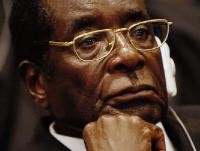Nigerian author Wole Soyinka -- the first African to win the Nobel prize in literature -- famously described the Organization of African Unity (OAU) as a "collaborative club of perpetual self-preservation." Part of the reason the continental body re-branded itself as the African Union (AU) in 2001 was to distance itself from the days when the most brutal of dictators took a break from killing the opposition and stealing state funds to mingle with colleagues in fancy hotels. As the African Union summit in Egypt closed July 1, its failure to take any serious action on Mugabe's crumbling Zimbabwe was reminiscent of the long period when the OAU simply looked the other way. After Zimbabwe's blatantly unfair election, much was made of the opportunity for the AU to prove its recently democratized values were more than words alone. The organization's latest charter, adopted with the name change in 2001, codified democratic principles like constitutionalism, separation of powers, human rights, freedom of expression, and political pluralism. It even strengthened the AU's power to intervene in member countries in "grave circumstances." Presented with undeniably grave circumstances in Zimbabwe and the support of almost every Western power, the AU did nothing. Is anyone really surprised?
After the AU’s Failure, What to Do About Zimbabwe?

